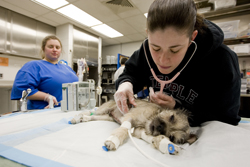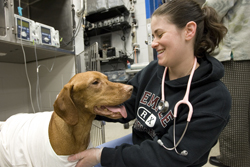Gone to the dogs
School of Pharmacy students advise, learn at country’s oldest veterinary school
| Pet owners expect their veterinarian to be able to fix what ails Fido. After all, they’ve spent years learning the literal “ins and outs” of all sorts of animals. But students studying to become veterinarians typically only take one semester of pharmacology, or how drugs act upon a patient. And you can’t count on dogs or cats to tell you if a medication is working.
Aware that veterinarians could benefit by increasing their pharmaceutical knowledge, Joy Baumgardner has come up with a solution that benefits not only veterinarians in training, but also her students at Temple’s School of Pharmacy. She’s arranged for fourth-year PharmD students to perform an elective rotation at the University of Pennsylvania Veterinary School, the oldest and one of the most highly regarded veterinary schools in the country. “This arrangement allows our students to share their pharmaceutical expertise and |
 Photo by Ryan S. Brandenberg/Temple University
Fixing Buddy’s birth defect:
Fourth-year Pharm.D. student Abby Rosina listens to the lungs and heart of Buddy, a three- month-old puppy that underwent liver shunt surgery. The pup was born with the defective blood vessel (shunt), which carried blood around the liver instead of through it. Buddy went home a few days after this photo was taken and is recovering nicely. |
|
also teaches them more about animal medicine,” says Baumgardner, PhD., associate professor of pharmacognosy and associate director of graduate studies at the School of Pharmacy. “From a human perspective, I want our students to be able to help their animals get well.” There is no shortage of patients inside the veterinary Intensive Care Unit. Some are confined to oxygen chambers, others suffer from age-related conditions, while many are rushed in for emergency care. Baumgardner got her first taste of this environment 20 years ago when she began taking students on tours of the Veterinary School. She developed a friendship with one of the veterinarians in charge of the Intensive Care Unit and began selecting students from her “Veterinary Pharmacy” class to take part in a five-week clinical rotation in the ICU. Now, this year, for the first time, a handful of those students will earn credits as they work alongside veterinarians, technicians and students five days a week, advising them on medications or dosages. |
|
 Photo by Ryan S. Brandenberg/Temple University
“Hands-on” training: Rosina holds Gunner so he doesn’t run off and pull his IVs out as a technician prepares to change his urinary catheter bag.
|
“I help everyone in the ICU understand the side effects of certain drugs and what you need to monitor for when you’re administering those drugs,” says PharmD student Abby Rosina. “Just the other day, a vet prescribed the drug doxycycline for a dog with kennel cough, but didn’t tell the owner to give it to the pet on an empty stomach. Otherwise, it won’t work. The owner was wrapping the medicine in cheese, so fortunately, I was able to step in and advise how to give the drug so it actually helps the dog.” As the first year of rotations wrap up, it appears this new clinical cooperation is a success. Baumgardner believes the key is choosing animal lovers who cherish their |
|
pets as much as she loves her rescued Greyhounds. “The students who say they love animals are the ones I would like to have involved in this program. Eventually, the University of Pennsylvania School of Veterinary Medicine may be ready to bring a pharmacist on board full time. I want our students to be ready for the job.” |
|